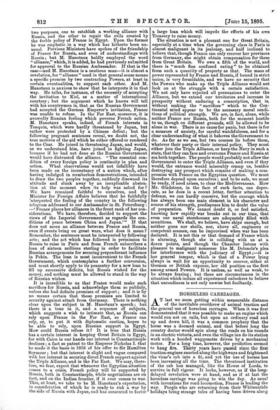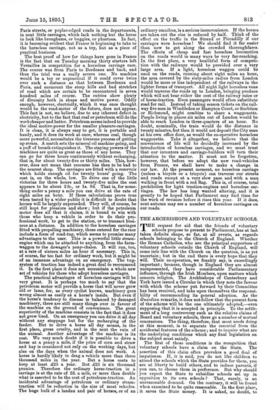HORSELESS CARRIAGES.
AT last we seem getting within measurable distance of the inevitable overthrow of animal traction and the general use of homeless carriages. When it was first demonstrated that it was possible to make an engine which would run not on rails, but upon an ordinary road and up and down hill, it was a common prophecy that the horse was a doomed animal, and that before long the country doctor would spin along the roads on his rounds in an electric victoria, and even the village inn do its station work with a hooded waggonette driven by a mechanical motor. For a long time, however, the prediction seemed to hang fire. Thirty years have passed since the first traction-engines snorted along the highways and frightened the vicar's cob into a fit, and yet the use of horses has been increasing all the time. The threatened institution of the cab has managed, like the House of Lords, to survive in full vigour. It looks, however, as if the long- delayed revolution were at hand, and as if at last the horseless carriage was going to win the day. As usual with inventions for roallocomotion, France is leading the way. People who are returning from their Whitsuntide holidays bring strange tales of having been driven along Paris streets, or poplar-edged roads in the departments, in neat little carriages, which lack nothing but the horse to look like broughams, or buggies, or phaetons. In fact, it is becoming evident that France is beginning to take to the horseless carriage, not as a toy, but as a piece of practical business.
The best proof of how far things have gone in France is the fact that on Tuesday morning thirty starters left Versailles in competition for a horseless carriage race. The course was from Paris to Bordeaux and back, and thus the trial was a really severe one. No machine would be a toy or unpractical if it could cover twice over such a distance as that between Bordeaux and Paris, and surmount the steep hills and bad stretches of road which are certain to be encountered in seven hundred miles of course. The entries show plenty of diversity both in shape and motive power. Oddly enough, however, electricity, which it was once thought would be the road-motor of the future, does not appear. This fact is not, we believe, due to any inherent defect in electricity, but to the fact that coal or petroleum will do the work cheaper and better. Petroleum seems indeed to provide the ideal motive-power for the smaller pleasure-carriages. It is clean, it is always easy to get, it is portable and handy, and it does its work at once, whereas coal, though more powerful, necessitates the tiresome process of getting up steam. A match sets the mineral oil machine going, and a puff of breath extinguishes it. The staying powers of the machines are quite as great as those of any horse. They can go for three hours continuously without recharging, that is, for about twenty-five or thirty miles. This, how- ever, does not mean that recourse has then to be had to the nearest shop. The carriages are fitted with a reservoir which holds enough oil for twenty hours' going. The cost is, on the whole, low. To drive one of the little victorias for three hours and twenty-five miles the cost appears to be about 2 fr., or ls. 8d. That is, for some- thing under a penny a mile you can drive at the rate of eight miles an hour. If these calculations prove true when tested by a wider public it is difficult to doubt that horses will be largely superseded. They will, of course, be still kept for pleasure and show ; but if the petroleum motor does all that it claims, it is bound to win with those who keep a vehicle in order to do their pro- fessional work, to get to the station, or to transact busi- ness at a distance. In addition to the horseless carriages fitted with propelling machinery, those entered for the race include a form of road-tug, which seems to promise many advantages to the user. This is a powerful little steam- engine which can be attached to anything, from the farm- waggon to the dowager's pony-chaise. It will run, too, at a rate of sixteen miles an hour if necessary. This is, of course, far too fast for ordinary work, but it might be of an immense advantage on an emergency. The tug- system of traction has indeed a great deal to recommend it. In the first place it does not necessitate a whole new set of vehicles for those who adopt horseless carriages.
The practical advantages of horseless carriages will be very great. It is perhaps too much to say that the petroleum motor will provide a horse that will never grow old or lame, for, as every cyclist knows, machinery goes wrong almost as easily as a horse's inside. But even if the horse's tendency to disease is balanced by damaged machinery, there are still many things over in favour of the machine on the ground of convenience. The great superiority of the machine consists in the fact that it does not grow tired. On an emergency you can drive it all day without any stoppage but for the recharging of the feeder. But to drive a horse all day means, in the first place, gross cruelty, and in the next the ruin of the animal. Another advantage of the machine is its cost. We very much doubt if it is possible to drive a horse at a penny a mile, if the price of corn and straw and hay is considered not only on the working days, but also on the days when the animal does not work. A horse is hardly likely to drag a vehicle more than three thousand miles in the year. But a horse costs to keep at least £25 a year. But £25 is six thousand pennies. Therefore the ordinary horse-traction in a carriage is at the rate of 2d. a mile, or more than double what is asserted to be the cost of petroleum-traction. An incidental advantage of petroleum or ordinary steam- traction will be reduction in the size of most vehicles. The huge bulk of a landau and pair of horses, or of an ordinary omnibus, is a serious inconvenience. If the horses are taken out the size is reduced by half. Think of the effect on the traffic in the Strand or Piccadilly if our carriages were horseless ! We should find it far easier than now to get along the crowded thoroughfares. The effects of cheap and fast horseless locomotion on the roads would in many ways be very far-reaching. In the first place, a very healthful form of competi- tion with the railways would be provided over a very large area. If a light, homeless waggon could be used on the roads, running about eight miles an hour, the area covered by the sixty-miles radius from London would be more or less independent of the railways in the lighter forms of transport. All night light horseless vans would traverse the roads up to London, bringing produce which will not bear either the cost of the railway rates or of horse-traction. Even passengers would often substitute road for rail. Instead of taking season tickets on the rail- way five men in Wimbledon or Hampton Court, or Surbiton or Richmond, might combine to share a waggonette. People living in places six miles out of London would be able to reach London in three-quarters of an hour. No doubt, nominally, the train would do the distance in twenty minutes, but then it would not deposit the City man at his own office door, as would the co-operative horseless waggonette. Take it altogether, we believe that the convenience of life will be decidedly increased by the introduction of horseless carriages, and we must trust that our inventors and carriage-builders will turn their attention to the matter. It must not be forgotten, however, that before we adopt the new road-vehicles from France, we shall have to make a change in our law. At the present moment, no horseless carriage (unless a bicycle or a tricycle) can traverse our streets and roads except at a very slow pace and with a man walking in front with a red flag. This is, of course, total prohibition for light traction-engines and horseless car- riages. The law has long wanted altering, and it is greatly to be hoped that Parliament may find time for the work of revision before it rises this year. If it does, next autumn may see a number of horseless carriages on our roads.



































 Previous page
Previous page